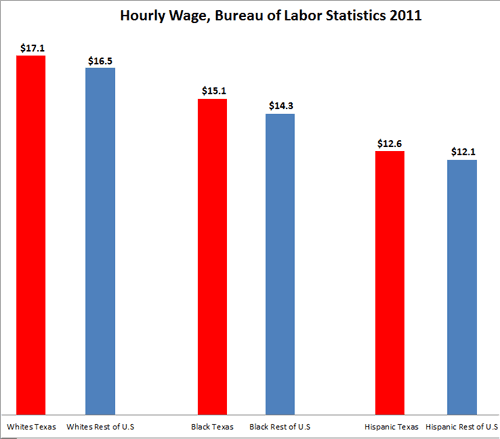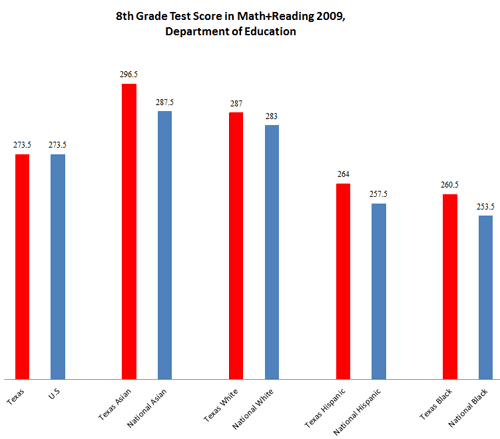I am not a fan of Rick Perry. Unlike President Obama, Perry is not smart. Perry is the worst of both worlds: he unnecessarily alienate leftist and moderates by pushing all their cultural identifications buttons, at the same time as he engages in ultra-liberal open border policies with taxpayer’s money.
The media may refer to Perry’s policy of using taxpayer money to pay for the college of illegal immigrant as “moderate“. But a policy which is opposed by 86 percent of the public even in a Democrat state such as Wisconsin is hardly “moderate”. Compared to views of voters, Perry’s policy is extreme-left. His defense that without having their college education paid for by taxpayers illegal immigrants would live of “government dole” is unconvincing, since illegal immigrants are not legally supposed to receive welfare.
Though I feel no need to defend Perry, let me defend the state Texas itself, which is currently under attack because of Perry.
Texas has had rapid job growth. Leftist such as Paul Krugman argue that this is irrelevant, because we have to adjust for demography. Texas also has fast population growth (apparently supply does matter even during recessions). Fair enough, I wrote about the role of population growth for Texas a while ago.
At the same time, left-wing economists such as former U.S. secretary of labor Robert Reich attack Texas for being a state where workers are paid poorly.
“While Texas leads the nation in job growth, a majority of Texas’ workforce is paid hourly wages rather than salaries. And the median hourly wage there is $11.20, compared with the national median of $12.50 an hour.”
Reich writes that the Texas model is one of “low wages“ and “lower incomes”, and not right for the U.S.
However, if you want to make demographic adjustment for job growth, you need to make demographic adjustment for wages. Yes, Texas has lower average wages than the U.S. But in fact, Texas whites, Texas Hispanics and Texas African Americans each earn higher wages than whites, Hispanics and African American in the rest of the country.

This is an instance of what statisticians refer to as Simpson’s Paradox. Each group earns more in Texas, yet the average is lower, because the state has higher share of the low earning groups.
The lower wage rates in Texas are entirely due to the demographic composition. Texas is 45% white, compared to 64% nationally, and Texas is 38% Hispanic, compared to 16% nationally.
The data is from 2011, hourly wages, from the Current Population Survey of the Bureau of Labor Statistics. I look at those ages 20-65. Indeed, I find that average for all groups is slightly lower in Texas than the rest of the country.
But as you see, each demographic groups earns higher hourly wages in Texas. The same is true for mean and median total salary, Texas is on average lower, but Whites, Blacks and Hispanics are each higher in Texas than the other States.
Demographically adjusted, It would be more accurate to say that Texas is characterized by a high wage (and high ethnic diversity) model.
Robert Reich also complains “Texas schools rank 44th in the nation in per-pupil spending.”
Sure, but again, each ethnic group has higher high school test scores in Reading+Math in Texas than the average for the U.S. The data is from Department of Education NAEP. The graph is truncated at 200 points, to make it easy to read.

The overall average is identical in Texas and the Nation as a whole. Yet all groups do better in Texas than the Nation as a whole. The only reason the average is not higher in Texas is that the state has a higher share of lower than average performing Hispanics. Even though Hispanics in Texas outperform Hispanics in the rest of the country, their share number depresses the Texas mean and dominates the result.
The Simpson paradox in wages and the near-Simpson’s paradox in test scores highlight the increasing importance of demographic composition for social outcomes.
Disclaimer: This page contains affiliate links. If you choose to make a purchase after clicking a link, we may receive a commission at no additional cost to you. Thank you for your support!



Leave a Reply